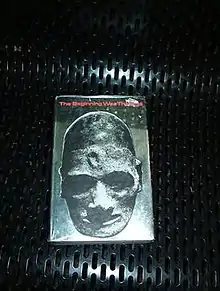The Beginning Was the End
The Beginning Was the End is a 1971 pseudo-scientific book written by Oscar Kiss Maerth that claims that humankind evolved from cannibalistic apes.[1] The book has been criticized in relation to racialist and pseudohistorical claims.
 The cover of the UK First Edition of The Beginning Was the End. This particular copy has been signed by three members of Devo. | |
| Author | Oscar Kiss Maerth |
|---|---|
| Original title | Der Anfang war das Ende – Der Mensch entstand durch Kannibalismus |
| Translator | Judith Hayward |
| Country | West Germany |
| Language | German (later translated into English) |
| Genre | Pseudoscience |
Publication date | West Germany: 1971 United Kingdom/United States: January 1, 1974 |
| Media type | Hardcover |
| ISBN | 0-7221-5712-6 |
Publication
Maerth wrote the book in a Chinese monastery.[2]
It was first published in West Germany as Der Anfang war das Ende – Der Mensch entstand durch Kannibalismus (Econ Verlag GmbH, Düsseldorf und Wien, 1971), then translated by Judith Hayward and published in Great Britain by Michael Joseph, Ltd, 1973 and re-issued by Sphere Books, Ltd, London in 1974, ISBN 0-7221-5712-6. It has been translated into eight languages.
Synopsis
The Beginning Was the End claimed that modern humans devolved from a species of brain-eating apes.[3] According to Maerth, this diet increased the apes' brain size, sex drive, and aggression, but suppressed their purported innate psychic ability, eventually causing insanity.[1] Maerth offered no evidence for his theories, basing them largely on his alleged meetings with cannibals in Java and New Guinea[4] and his experiences eating raw ape brains in a restaurant in Southeast Asia. He hints at having activated his latent psychic abilities through altering the shape of his skull in the manner of Incan tribes and/or trepanation, and his theories claimed to be mostly derived from the resulting divine inspiration. The frontispiece of Maerth's book says that after his travels in Asia, South America and Australia he settled in Italy where he lived with his wife and three children on Lake Como, where he was involved in the restoration of Villa Passalacqua.[5] While future volumes were promised in the course of the text, none ever appeared, with the exception of The Speech of Moltrasio, a very rare 8 page pamphlet.[6]
Popular culture
The book's legacy comes largely from the new wave band Devo, who incorporated several elements of the book into their concept of "de-evolution" and even adopted the book's title for their short film, In the Beginning was the End: The Truth About De-evolution.[7] Bassist/synth player/vocalist Gerald V. Casale said of the book, "It's a better story than the Bible as far as DEVO's concerned."[8] The cover of the 1989 album Now It Can Be Told is based on the cover of the US paperback edition.
See also
Notes
- Barton, Chris (13 June 2003). "Wacky evolution and the survival of the unfittest theories". The New Zealand Herald. Retrieved 28 March 2010.
- Maerth 1974, p. 7.
- Game, Ann; Andrew W. Metcalfe (1996). Passionate sociology. SAGE. p. 72. ISBN 978-0-8039-7461-6.
- Wilson, Colin (1984). A criminal history of humanity, Volume 1984, Part 2. Granada. p. 110. ISBN 978-0-246-11636-9.
- http://www.barclayweb.com/DESTINAT/ITALY/PROPS/Lakecomo/cov-passalacqua.htm
- Maerth, Oscar Kiss (1 January 1974). The speech of Moltrasio. Omnia Mundi. ASIN B0007C60FA.
- Cateforis, Theo (Winter 2004). "Performing the Avant-Garde Groove: Devo and the Whiteness of the New Wave". American Music. 22 (4): 564–588. doi:10.2307/3592993. JSTOR 3592993.
- Acid Logic Interview with Gerald V. Casale Archived March 3, 2016, at the Wayback Machine
References
- Maerth, Oscar Kiss (1974). The Beginning was the End. Translated by Hayward, Judith. London: Sphere. ISBN 0-7221-5712-6.
External links
- "Devo Brainwasher #01 featuring chapter headings from The Beginning was the End". Archived from the original on 12 April 2005. Retrieved 25 March 2007.
- The Mystery of the Apple, an Italian comic book illustrating Maerth's theories
- https://citeseerx.ist.psu.edu/viewdoc/download?doi=10.1.1.869.8464&rep=rep1&type=pdf